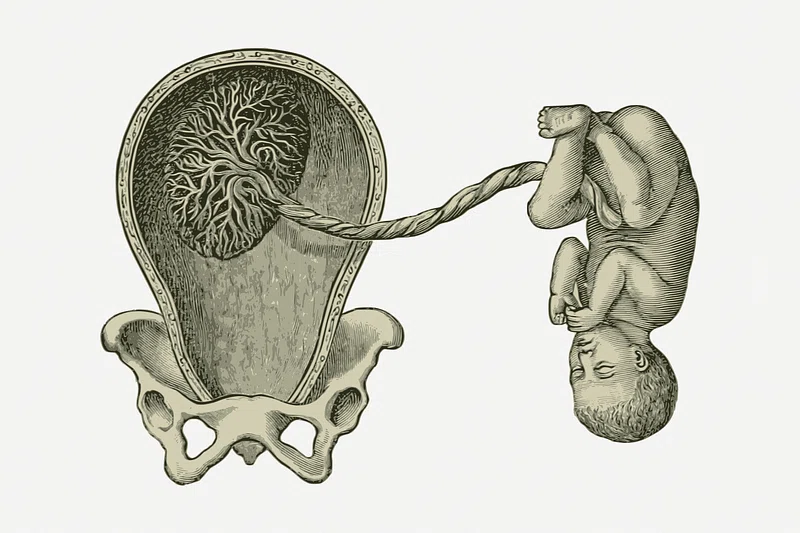On September 29th, 2023, an opinionated article was posted to the advocate. An individual in my class named Zachary Savage was responding to an older paper about the importance of abortions that argued that they should be legal. Zachary Savage wrote some engrossing arguments, but most of his reasoning was of religious basis and cited no sources for any facts he did mention. His argument was that a fetus is alive and comparable to a born, living human and hence should have the same rights, but I disagree. In the debate of abortion rights, however, neither my nor Zachary’s opinions about the philosophical definitions of human life are of any importance. Medical and legal decisions in our society are based on research evidence, not religious beliefs and feelings.
One of Zachary’s’ principal arguments is that the fetus is alive. As he mentioned, there are 8 characteristics scientists require to call something alive: cellular organization, reproduction, metabolism, homeostasis, heredity, response to stimuli, growth and development, and adaptation through evolution. By this definition, many other things are living like bacteria or plants that we kill regularly with no thought, so something being alive is not a meaningful characteristic of a fetus to give it the same value as living human life. Also, a fetus being “living” is necessarily true and a gray area even within science. A fetus cannot maintain its own homeostasis for most of its existence, for example, so by this definition, a fetus is not even alive until it can survive outside the womb. If you were to remove a fetus from the mother’s womb, it would not be able to sustain life naturally. Regardless, what is the significance of arguing this point as support for why abortion should be illegal? Similarly, Zachary also argues that a fetus is a human being, which again is an argument about the meanings of words and language and not about actual science or real-world effects of abortion. His arguments defining human life and assigning value are based on nonscientific semantics and personal philosophies are completely valid opinions, but this is not how we make our laws in America.
Zachary made a point about abortions not being safe. He wrote, “A lot of pro-choice defendants will question the mother’s safety. If you take a look at the available statistics, you can see that the action of having an abortion has the same or higher complication rate as giving birth,” and went on to say that chemical abortions can be dangerous. Chemical abortion is very safe. In fact, it’s safer than many other medicines like penicillin, Tylenol, and Viagra. Serious problems are rare, but like all medicines, there can be risks such as;
- The abortion pills don’t work and the pregnancy doesn’t end
- Some of the pregnancy tissue is left in your uterus
- Blood clots in your uterus
- Bleeding too much or too long
- Infection
- Allergic reaction to medication
Chemical abortions have risks but they are very uncommon, and if they do happen, they are easy to take care of with other medications. But saying it’s more unsafe than labor is a big fat lie. Fortunately, in the U.S. we have clean advanced hospitals that care about mothers and babies if you have the money. We have some of the best hospitals, and if something goes wrong in labor, there are many things you can do to fix it, the same goes for abortions. Some common complications of pregnancy include but are not limited to, the following.
- Labor that does not progress
- Perineal tears
- Problems with the umbilical cord
- Nerve damage
- Abnormal heart rate of the baby
- Water breaking early
- Perinatal asphyxia
- Shoulder dystocia
- Excessive bleeding
- Pregnancy loss/miscarriage
- Stillbirth
- Deformation to baby
- Vaginal trauma and general trauma to the body
- Paralysis
- Severe, persistent nausea and vomiting
- Postpartum
- Uterine prolapse
- Death
- Ectopic pregnancy
- Infections
- Bladder trauma
- Umbilical cord complications (wrapping around the infant’s neck)
It’s flat-out disrespectful to say pregnancy is safer than abortion of any kind. Many lose their lives to childbirth, and the complication rate of pregnancy is around 8%. The maternal mortality rate for 2021 was 32.9 deaths per 100,000 live births. In 2021, 1,205 women died of maternal causes in the United States alone.
The total abortion-related complication rate is estimated to be about 2% During the period from 1998–2010, of approximately 16.1 million abortion procedures, 108 women died, for a mortality rate of 0.7 deaths per 100,000 procedures overall. Deaths associated with legally induced abortion continue to be rare events—less than 1 per 100,000 procedures
Zachary also argues that abortions are an invasive procedure. The term invasive procedure is not a well-defined medical term among medical professionals. It’s only used in these arguments as a scare tactic to discourage certain surgeries and make them seem less safe. Procedures like plastic surgery, IUD insertions, c-sections, pap smears, colonoscopies, and circumcisions are all considered invasive procedures. All are typical routine procedures that nobody has a problem with. The argument of abortions being invasive is not important or meaningful for the debate of legalization.
My dear friend a 17-year-old girl from Vancouver, was a victim of rape at age thirteen and received medical attention afterward, soon after she found out she was pregnant during her time in the hospital, and 5 weeks of thinking after that, she went to Willow clinic and got it terminated. In a one-on-one interview with her, this is what she stated:
“A lot of the time and still to this day I feel anger about it, what that man did to me, and what people have to say about the decision that me and my father made. A lot of religious freaks have shunned me and made me feel ashamed. I am catholic and have been from the start. I believe god wouldn’t have wanted me to carry that baby that would’ve caused me so much harm. I think I would have ended up killing myself if I had to carry a baby for 9 months, push it out of my thirteen-year-old 4’11 body, and raise it. I wouldn’t be able to love a child with the face of my rapist. It would’ve been an everyday reminder of what happened to me when I was thirteen. I did feel bad at one point, but I never for a second regretted it. It was what was right for me, my well-being, my life, and my future—My heart aches for women in Alabama and the deep South who now cannot receive abortions no matter the situation. I remember seeing news about the laws and breaking down on my living room carpet. Oregon and Washington are so extremely lucky to have protective laws in place.” It’s easy to talk about abortions as statistics like it’s a fairy tale, but it’s more real and closer than you could ever imagine. Oregon’s laws protect girls in similar situations to my friend.
And let’s talk hypothetically for a second, and say that abortions were fully banned in the United States. The overall number of maternal deaths would go up by 24 percent. Young girls would have to experience childbirth and risk being paralyzed or dying. It wouldn’t help overpopulation, it would force people into families, maternal roles, and parenthood way too early. People would get desperate and drive down to Mexico to get an abortion procedure done unsafely, uncleanly, and illegally. With a high risk of death, infection, and many complications. or people would just take it into their own hands and take a clothes hanger, or their lives into their own hands. Unwanted children are subjected to abuse and neglect. Postpartum depression, regret, finances, age, and not being ready and that kind of responsibility is no joke when mixed together. It would be jeopardizing the safety and care of numerous children. And if you even say anything about putting it up for adoption, you are the scum of the earth because the adoption system is so extremely rigged and traumatizing for children. 50 out of 297 kids in the foster care system end up on the streets by 18. Why give a chance at life if said life will be full of pain and hurt for everybody?
The beauty of our American legal system is that we make laws that protect people in very rare extreme cases even though not many women get pregnant by horrible incidents. Horrendous cases DO happen and we can’t shut our blinds to them, no matter the reasoning. Even if you believe abortion is only acceptable in cases of rape or incest and not if you are just “careless,” that should not dictate our laws. This belief is respectable, but we must consider the extreme cases because even 2% of the population is still 28 million. To help you understand this, 2% of the population are gingers, and gingers are running around everywhere. Among adult women and young girls, an estimated 32,100 pregnancies result from rape each year. The national rape-related pregnancy rate is 5.0% per rape among victims at a reproductive age.
Zachary is a respectable and religious man who takes on a deep care of unborn children. The arguments he presents are sufficiently valid for justifying his beliefs against abortion, but personal beliefs are not how we write our laws. He also explicitly states his belief comes from a religiously biased source and unqualified professionals without experience in medicine or policy making. While The Constitution entitles people to freely share their own opinions and religious beliefs, it does not entitle all opinions to be equally valued in all conversations.
Pro-life laws do directly restrict others from being able to access health care. Concrete evidence that abortion is explicitly negative from a medical and sociological perspective is not adequate enough to warrant its restriction from consenting participants On the other hand, pro-choice laws do not prevent anyone who personally disagrees with abortion from living and advocating for the protection of unborn fetuses. If valuing human life and the rights of unborn babies is of utmost concern for pro-life advocates, why do advocates only focus on changing the law instead of devoting time and energy to more immediately impactful support systems? The most recent estimates show around 319,000 children currently in foster care (U.S. Department of Health and Human Services, 2021). Why are advocates not as interested in reducing this number, or contributing to organizations that support parents with unexpected pregnancies? Why is more effort not being put towards educating young teens about safe sex, birth control, or rape to help reduce unplanned or unwanted pregnancies? What about funding or contributing to research about women’s sexual health to create better birth control or better treat life-threatening pregnancy complications? The dialogue of pro-life abortion arguments is that making abortion illegal is the only way to help unborn human babies, yet abortion access does not prevent anyone from trying to prevent individuals from choosing to have an abortion or offering other modes of support. But I suppose we can all have our own opinions. God bless.






























































































































